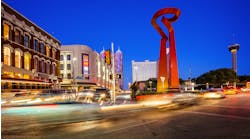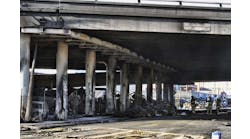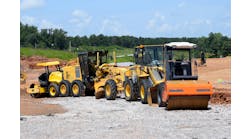If investments in surface transportation infrastructure are not made soon, those costs are expected to grow exponentially. Within 10 years, U.S. businesses would pay an added $430 billion in transportation costs, household incomes would fall by more than $7,000, and U.S. exports will fall by $28 billion.
“Clearly, failing to invest in our roads, bridges and transit systems has a dramatic negative impact on America’s economy,” said Kathy J. Caldwell, P.E., F.ASCE, president of ASCE. “The link between a nation’s infrastructure and its economic competitiveness has always been understood. But today, for the first time, we have data showing how much failing to invest in our surface transportation system can negatively impact job growth and family budgets. This report is a wake-up call for policymakers because it shows that investing in infrastructure contributes to creating jobs, while failing to do so hurts main street America.”
Productivity across the business sector will tumble. Those increased costs will cause businesses to underperform by $240 billion over the next decade, which will drive the prices of goods up. As a result, U.S. exports will fall by $28 billion, including 79 of 93 tradable commodities. Ten sectors of the U.S. economy account for more than half of this unprecedented loss in export value – among them key technology sectors like machinery, medical devices, communications equipment, which produces much of this country’s innovations.
America would also lose jobs in high-value sectors as business income goes down. Of the almost 877,000 jobs that would be lost by 2020, most would come in the high-value, professional, business and medical sectors which are vital to America’s knowledge-based service economy.
Ultimately, Americans will get paid less. While the economy would lose jobs, those who are able to find work will find their paychecks cut by nearly 30%.
A lack of investment in transportation infrastructure would inflict a double whammy on American families who would see their household incomes fall by $60 a month by 2020, while having to spend $30 per month more for goods. The total cost to families would exact about $10,600 per family between now and 2020, equal to $1,060 per year on household budgets.
The report estimates that in order to bring the nation’s surface transportation infrastructure up to tolerable levels, policymakers would need to invest approximately $1.7 trillion between now and 2020 in the nation’s highways and transit systems. The U.S. is currently on track to spend a portion of that - $877 billion - during the same timeframe. The infrastructure funding gap equals $846 billion over 9 years or $94 billion per year.
Small investments in infrastructure, equal to about 60% of what Americans spend on fast food each year, would:
• Protect 1.1 million jobs; • Save Americans 180 million hours in travel time each year; • Deliver an average of $1,060 to each family; and • Protect $10,000 in GDP for every man, woman and child in the U.S.

